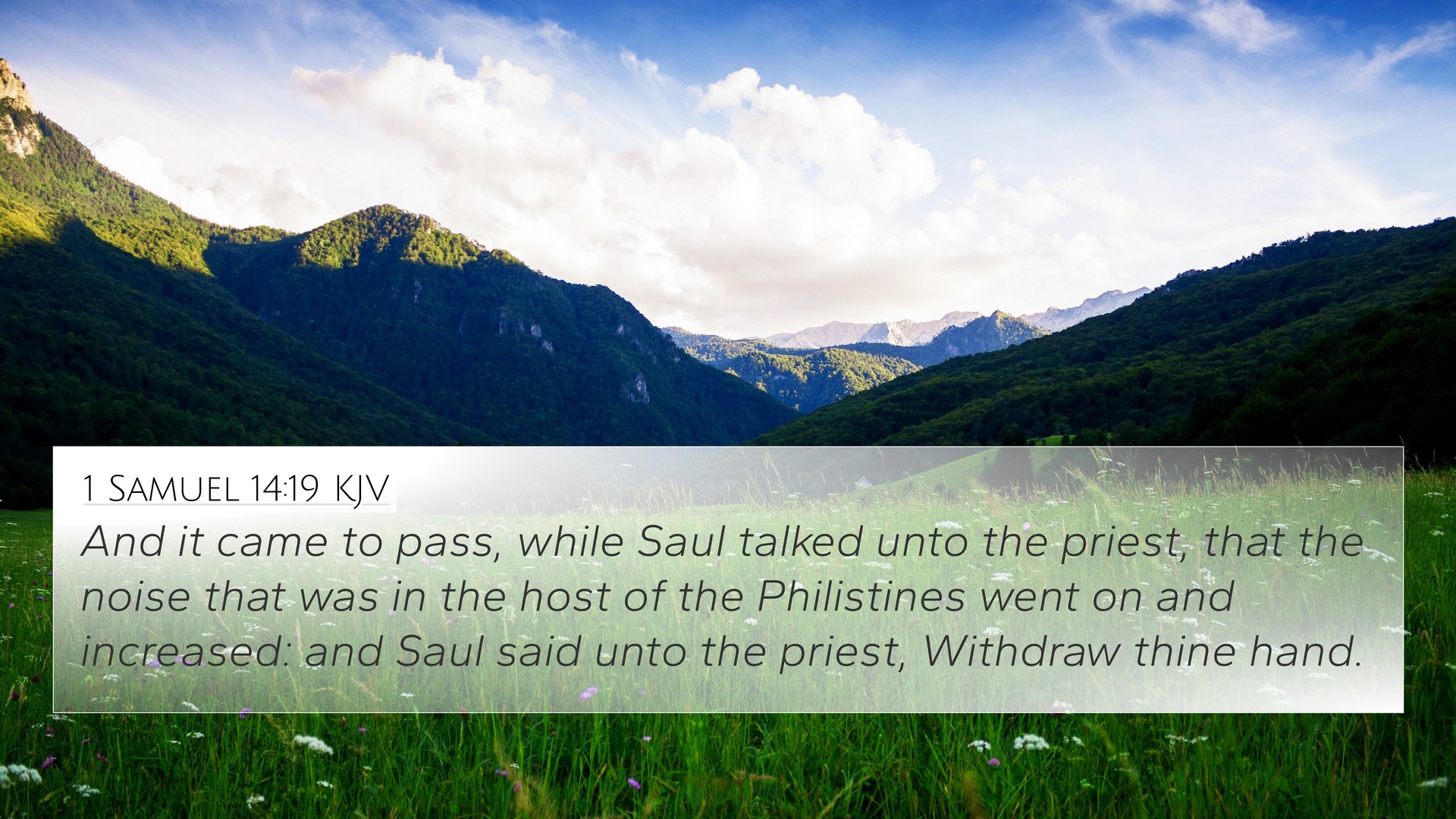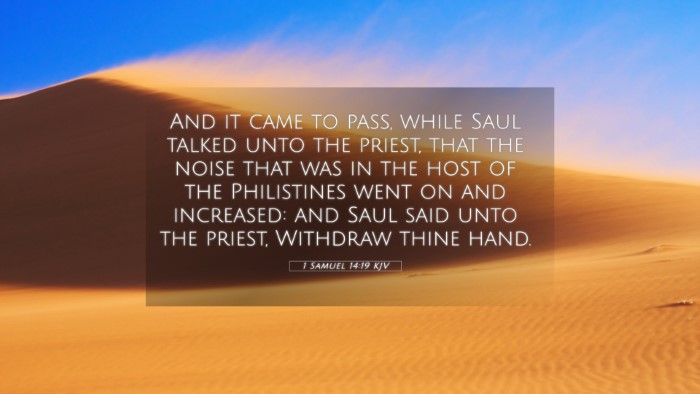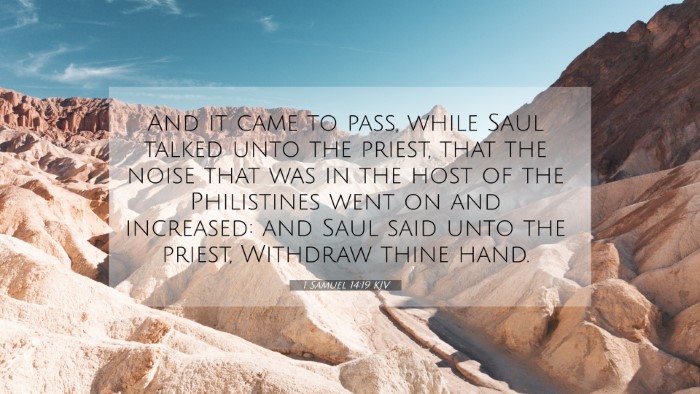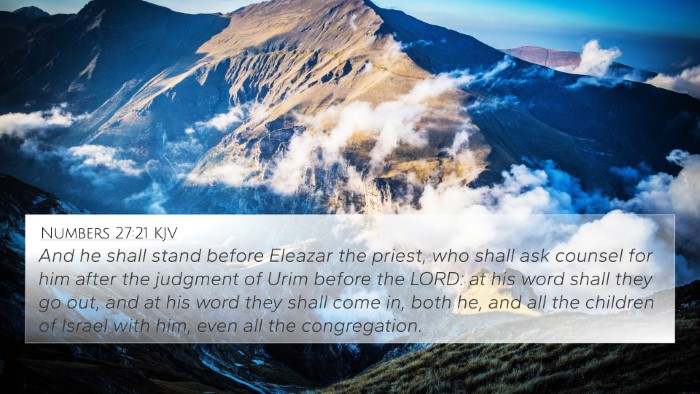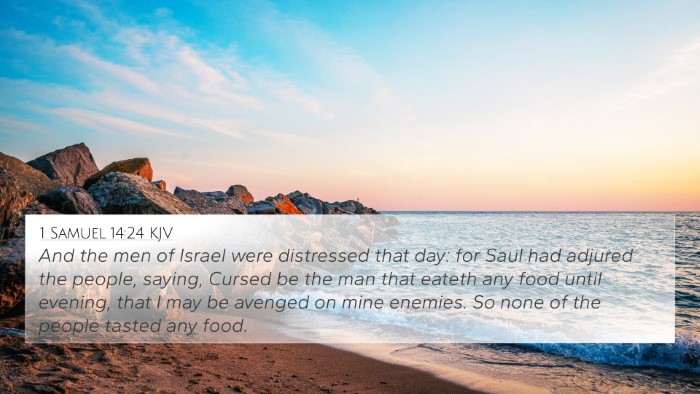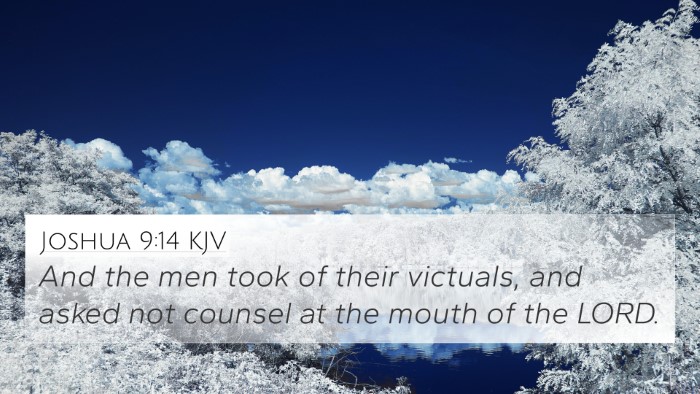Understanding 1 Samuel 14:19
Bible Verse: 1 Samuel 14:19 - "And it came to pass, while Saul talked unto the priest, that the noise that was in the host of the Philistines went on and increased: and Saul said unto the priest, Withdraw thine hand." (KJV)
Summary of the Verse
This verse occurs during a crucial moment in the battle between Israel and the Philistines. Saul, who is involved in a conversation with the priest, feels a growing commotion among the enemy ranks. This situation prompts him to make a decision that reflects both urgency and panic amidst the unfolding chaos.
Commentary Insights
Several public domain commentaries provide valuable insights into this verse:
- Matthew Henry: Henry notes that Saul’s conversation with the priest indicates a moment of seeking divine guidance. However, the increasing noise from the Philistines signifies that Saul must act decisively, representing the tension between seeking God and responding to immediate circumstances.
- Albert Barnes: Barnes emphasizes the significance of the transition from seeking God's guidance to acting in the face of adversity. His commentary points out Saul's struggle with both spiritual leadership and military command, portraying a leader torn between faith and urgency.
- Adam Clarke: Clarke elaborates on the complicating factors surrounding the priest's role and highlights the importance of divine guidance in warfare. He emphasizes that the urgency of the moment led Saul to abandon his consultation with the priest, symbolizing the broader struggle between faith and fear.
Thematic Connections and Cross-References
1 Samuel 14:19 connects with several other scriptures that examine themes of leadership, divine guidance, and the tension between faith and fear:
- 1 Samuel 10:22: Saul seeks the Lord amidst concerns of the people's desire for a king.
- Exodus 14:15: God instructs Moses to act during the crisis of the Red Sea, paralleling Saul's urgent response.
- Psalm 27:14: "Wait on the Lord: be of good courage, and he shall strengthen thine heart," reflecting a message of faithfulness in times of trouble.
- Isaiah 40:31: "But they that wait upon the Lord shall renew their strength," highlighting the power of divine assistance versus human urgency.
- Luke 6:12: Jesus spends time in prayer before making significant decisions, mirroring Saul’s need for guidance.
- Hebrews 11:32-34: Instances of faith are shown where actions follow trusting in God amid adversities.
- 2 Samuel 5:19: David inquires of the Lord before battling the Philistines, suggesting the importance of divine guidance in leadership.
- James 1:5: Encourages believers to ask for wisdom, affirming the principle of seeking divine wisdom in decision-making.
Teaching Points
The verse serves as a poignant reminder of the following:
- Importance of Divine Guidance: Leaders are encouraged to seek God's counsel before making decisions.
- Tension between Faith and Urgency: Believers may face moments where faith must contend with urgent circumstances.
- Acting in Faith: Despite immediate fears, taking decisive action based on faith is crucial.
- Listening to God's Voice: One must differentiate between God's voice and the noises of the world.
Conclusion
In summary, 1 Samuel 14:19 encapsulates a moment where divine guidance collides with human urgency. The insights from various commentaries highlight the complexities of leadership and faith when confronted with pressure. This verse not only serves as a historical narrative but also as a timeless lesson on the need to balance spiritual wisdom with immediate action. The connections drawn through cross-referencing enhance our understanding and encourage deeper study of the Scriptures as we identify links between biblical themes.
Resources for Further Study
To explore in-depth the connections between this verse and others, consider utilizing:
- Bible concordance for thematic studies.
- Tools for Bible cross-referencing for comprehensive analysis.
- Cross-reference Bible study guides to deepen understanding.
- Inter-Biblical dialogue resources for connecting Old and New Testament themes.
